Personal
The Personal is Political, my Heart Story of place
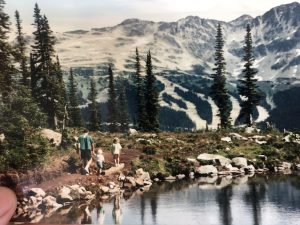
Family hike (My dad, brother and I, 1990), Whistler
In Journal entry (see below, right side), I capture the idea of home—the idea that change can only happen in the places we are invested in. In contrast to this, is the idea of a bioregionalist. A bioregionalist is a person knowing very little about their environment or the place that they reside in. A bioregionalist is not interested in the history of the place they reside in and therefore are only a resident. The person residing has no intimacy and connection to the land they live on and associated stories. David A. Greenwood (formerly called Gruenwald) Professor and Canada Research Chair of Environmental Education at Lakehead University in Thunder Bay, Ontario writes in his article The Best of Both Worlds: A Critical Pedagogy of Place (2003) the distinction between inhabiting and residing in a place:
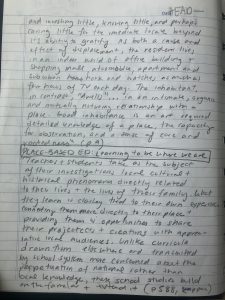
Place-Based Journal Entry
“A resident is a temporary occupant, putting down few roots and investing little, knowing little, and perhaps caring little for the immediate locale beyond its ability to gratify. As both a cause and effect of displacement, the resident lives in an indoor world of office buildings and shopping malls, automobiles, apartments, and suburban houses and watches as much as “four hours of television each day. The Inhabitat, in contrast, “dwells” . . . in an intimate, organic, and mutually nurturing relationship with place. Good inhabitance is an art requiring detailed knowledge of a place, the capacity for observation, and a sense of care and rootedness.” (p.9, 2003)
The concept of inhabiting and residing in a place, brings me back to a question that Milt McClaren asked our EDUC 452 class, on May 29th, 2020 during a Zoom call: How has the pandemic changed your thinking? and, Are we going back to normal?
Reflecting on this question, the most salient learning over the past few months has been discovering this place and shifting the paradigm of residing to inhabiting.
The Latin translation for apocalypse literally means uncovering. The Greek translation means revelation or an unveiling or unfolding of things not previously known and which could not be known apart from the unveiling. What has unfolded for me during COVID and the accompanied journaling has been finding my bearings in this place. I passed self-isolated hours turning the pages of memory-books from my childhood, including teenage-angst journals and photo albums that I never knew existed. I came across photos and stories that grounded me along the Pacific West Coast, in False Creek, and in the mountains. Prior to COVID, I had planned to move back to Toronto, Ontario after obtaining my BEd. I did not feel connected to Vancouver. Interestingly I grew up in False Creek, was born at Women’s Hospital (previously called Grace Hospital, located on Oak and King Edward, in Vancouver), my first home was in False Creek, and my mom lived in False Creek for several of my elementary school years.

Me, age 5, Expo Line, Skytrain.
My dad currently resides in False Creek. My parents got married at the top of the waterfall in Charelston Park, in False Creek. My master’s program was housed at City Studio, under the Cambie St. Bridge in False Creek. I have worked at False Creek Elementary for the past few years; similarly, I currently live in a coop located in Olympic Village, situated in False Creek.
All of my stories lead me back here. However, prior to COVID and my journaling experience, I was only just a resident of False Creek. During COVID I had the chance to spend time connecting to this place, with nowhere to go. My Spring break trip to Toronto was canceled, along with everything else. I spent time here connecting to stories of this place, having long conversations with my neighbours, and growing food. The journaling helped make a conscious connection to my heart’s feelings of inhabitance.
COVID reoriented me to my home, to False Creek, and with that came a deep appreciation of this place. To answer Milt McClaren’s question, COVID transformed how I relate to home. With that, I have a refreshed sense of connection to this place.
There is an obvious connection between my new connection of place and environmental pedagogies. It connects to the type of educator and leader I aspire to be. In Gregory Smith (2002) article titled, Place-Based Education: Learning to Be Where We Are, he writes, “teachers and students take as the subject of their investigations local cultural or historical phenomena directly related to their lives and the lives of their families. What they learn is closely tied to their own experience, connecting them more directly to their place and providing them with opportunities to share their projects and creations with appreciative local audiences. Unlike curricula drawn from elsewhere and transmitted by the school system more concerned about the perpetuation of national rather than local knowledge, these schools build on the familiar and then extend it” (p. 588). This approach expands my lens, rather than assuming that the answers are somewhere out there—there is a possibility to tap into the realm of depth available within the community itself.
“Back to normal?”
Sustainabiliteens, (a group of teen activists across the Lower mainland) wrote a post on Instagram on May 26th that read
“It’s obvious that climate action has been long overdue. Personal changes are not enough to combat this crisis when just 100 companies are responsible for over 71% of global emissions. ????????
Our capitalist/colonial system prevails greed, injustices, inequities, and harms the community and our climate. COVID-19 has not only perpetuated these inequities but exposed how blinded we were to them.
We need to create drastic changes in the way society functions. Now is the perfect time to do so.⚡️
It’s been seen firsthand throughout history, for example, back in 1919: the Spanish Flu. This epidemic highlighted the inequalities between social classes and led to implementing universal healthcare and low-income housing for the most vulnerable.” (Sustainabiliteens, Instagram, 2020)
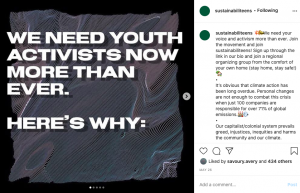
Instagram post, https://www.instagram.com/p/CAqYfeLnTE8/
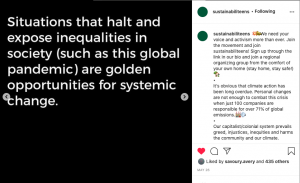
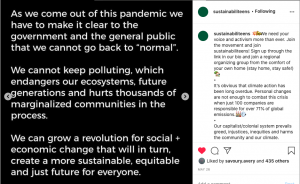 What normal do I want to go back to? I do not want to go back to the trajectory of a 2-degree increase in temperature. I do not want to go back to the norm where Jeff Benoz profits millions from COVID while 1 in every four black Americans are out of work. Yes, I canceled my Amazon Prime subscription in April. I do not want to go back to a reality where people of colour continuously struggle for equity.
What normal do I want to go back to? I do not want to go back to the trajectory of a 2-degree increase in temperature. I do not want to go back to the norm where Jeff Benoz profits millions from COVID while 1 in every four black Americans are out of work. Yes, I canceled my Amazon Prime subscription in April. I do not want to go back to a reality where people of colour continuously struggle for equity.
I don’t want to go back to normal!